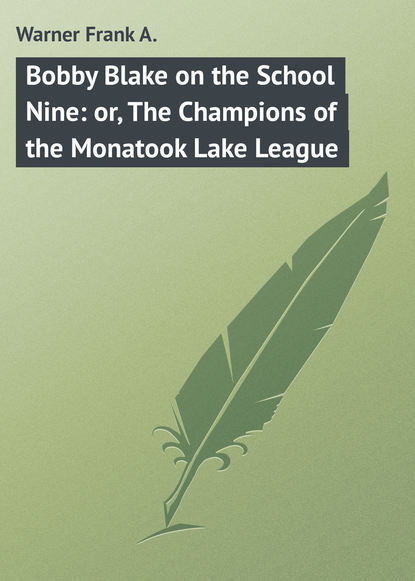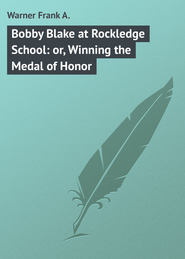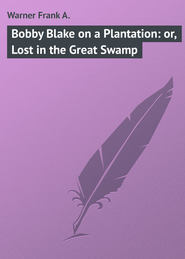По всем вопросам обращайтесь на: info@litportal.ru
(©) 2003-2024.
✖
Bobby Blake on the School Nine: or, The Champions of the Monatook Lake League
Настройки чтения
Размер шрифта
Высота строк
Поля
“She’s going, fellows!” shouted Mouser in despair, as a stream of smoke began to stretch out behind the moving train.
“And all our bags and things are on board!” wailed Fred.
“Now we’re in a pretty mess,” gasped Pee Wee, slumping down in the snow.
There was no use in hurrying now, and they looked blankly at each other as they came to a full stop.
“Scubbity-yow!” howled Fred as the only way to relieve his feelings.
“Well, I’ll be jiggered!” exclaimed Mouser.
Pee Wee was too tired out from his exertion to say anything, and Bobby, too, kept silent, though for a different reason. He was busy thinking of the best way to get out of the tangle.
“There’s no use in worrying about our baggage, fellows,” he said at last. “Probably the conductor will take good care of that. And we may be able to send a telegram from some place telling the conductor to put our things off at Rockledge and leave them in care of the station agent there. What we’ve got to worry about is ourselves. We can’t stay here, and we’ve got to find some way to get another train as soon as we can. Have any of you fellows got a time table?”
“I had one,” replied Mouser, “but it’s in my bag on the train.”
None of the others had one and Bobby came to a quick decision.
“There’s no other way,” he announced. “We’ll have to go back and ask Mrs. Wilson. She’ll know all about the trains and what’s the best station for us to go to.”
They trudged back rather forlornly and explained their plight to Mrs. Wilson, who was full of sympathy.
“I’d like to have you stay here all night,” she volunteered, “and Mr. Wilson will take you over to the station in a rig to-morrow morning.”
They thanked her heartily, but explained that this was out of the question. They would be missed from the train, telegrams would be flying back and forth and their parents would be anxious and excited. They must get to some place where they could either telegraph or, better yet, get a train that would land them in Rockledge that afternoon or evening.
“I’ll tell you what to do,” she suggested, as a thought struck her. “You can’t get a train on this line you’ve been traveling on until very late to-night. But there’s another road that crosses this at a junction about two miles from here and connects with the main line that goes on to Rockledge. There’s an afternoon train on that line that you’ll have plenty of time to make, and it will land you in Rockledge before night. There’s a telegraph office there too, and you can send any messages you like before you board the train.”
“That’s just the very thing,” cried Bobby with enthusiasm.
“Just what the doctor ordered,” chuckled Mouser.
She gave them very careful directions for finding the station, and as there was none too much time and the walking was bound to be slow they set out at once, after thanking their friend for having come a second time to their relief.
Their path led for the most part through a wood and they passed no other houses on their way. Even in summer it was evident that the locality was wild and deserted. Now with the snow over everything it was especially desolate.
“You might almost think you were up in the Big Woods,” commented Mouser.
“That’s what,” agreed Fred. “It would be a dandy place for train robbers and that kind of fellows.”
“I’d hate to be wandering around here at night,” remarked Pee Wee, who was panting with the exertion of keeping up with the others.
“It would give one a sort of creepy feeling, like being in a cemetery,” assented Bobby.
Suddenly Fred uttered an exclamation.
“There’s a little house right over in that hollow,” he cried, pointing to the right.
“More like a hut or a shack than a regular house, seems to me,” grunted Mouser.
“I don’t believe there’s any one living there,” commented Pee Wee.
“Yes, there must be,” declared Bobby. “I can see the light of a fire shining through the window.”
The hut in question was a dilapidated structure of only one story that stood in a little hollow just off the road. It was in the last stages of decay and looked as though a strong wind would blow it to pieces. There were no fences nor barn nor any wagon or farm implement in sight.
Yet that some one lived in the crazy shack was evident, as Bobby had said, by the red light that came flickeringly through the only window that the cabin possessed.
“Let’s stop there for a minute and get warm,” suggested Fred. “Then, too, we can make sure that we’re still on the right road to the station.”
“What’s the use?” cautioned Bobby. “We got left once to-day by stopping too long.”
“It will only take a minute,” urged Fred.
As the others also wanted to stop, and Bobby did not wish to insist too much, they all went down into the hollow together.
The snow of course deadened their footsteps, so that whoever was in the cabin had no notice of their approach.
Fred, who was in advance, rapped on the door.
There was silence for a moment and then the door swung open and a rough looking man appeared on the sill.
“What do you want?” he asked gruffly.
“We wanted to ask directions about the road,” said Fred, a little dismayed by the fellow’s surly manner.
The man looked them over for a moment, noticed that they were well dressed and hesitated no longer.
“Come in,” he said briefly, and stood aside for them to pass.
CHAPTER VI
HEAVY ODDS
Although feeling rather uneasy because of the man’s rough manner, the boys hardly saw what they could do but accept the invitation, and they went inside. The next moment they wished they had not.
There were two other men within the hut besides the one who had opened the door. They were seated at a bare pine table, and on the table there was a bottle of liquor. There seemed to be no other furniture in the miserable room, except a rusty wood stove, which was at white heat, two or three stools and a pile of hay in the corner, which evidently served as a bed.
The heat inside was stifling, and the room was rank with the fumes of liquor. The unshaven faces of the men were flushed, their eyes red and bleared, and a greasy pack of cards told of their occupation when they had been interrupted.
“Tramps,” whispered Bobby to Fred, who was nearest. “Let’s get out of this.”
“You bet,” returned Fred, as he made a motion toward the door.
But the man who had let them in now stood with his back against the closed door, looking at them with an ugly grin on his face, a face which was made still more repellant by a livid scar up near the temple.
“What do these young buckos want here?” asked one of the men at the table, rising and coming toward them. As he did so, Bobby noticed that he limped a trifle.







